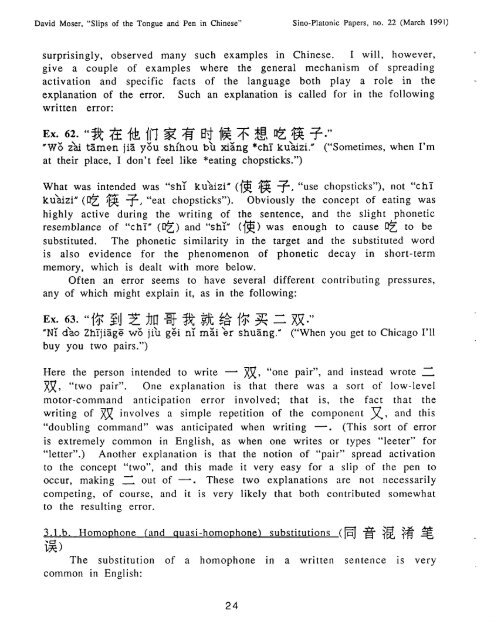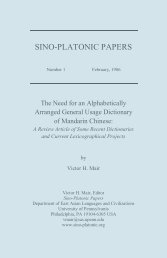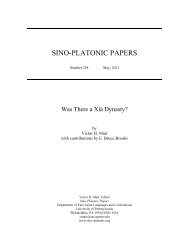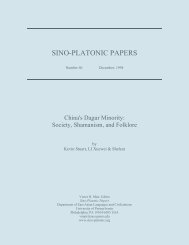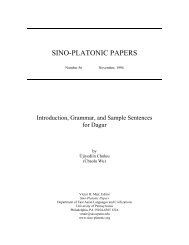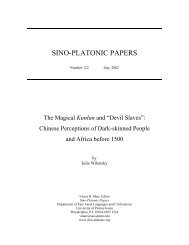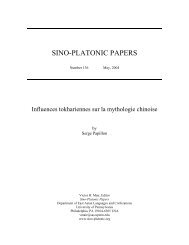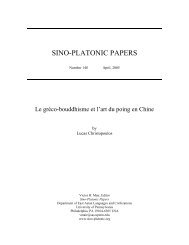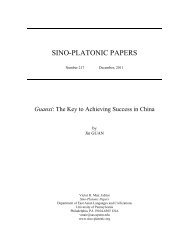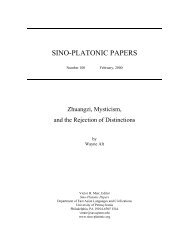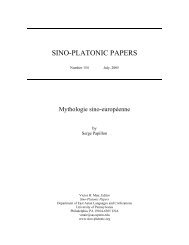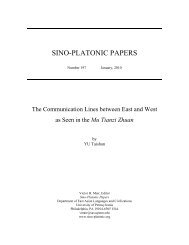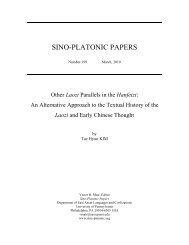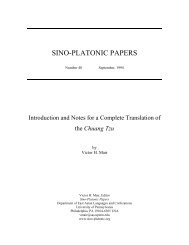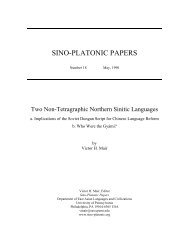Slips of the Tongue and Pen in Chinese - Sino-Platonic Papers
Slips of the Tongue and Pen in Chinese - Sino-Platonic Papers
Slips of the Tongue and Pen in Chinese - Sino-Platonic Papers
You also want an ePaper? Increase the reach of your titles
YUMPU automatically turns print PDFs into web optimized ePapers that Google loves.
David Moser, "<strong>Slips</strong> <strong>of</strong> <strong>the</strong> <strong>Tongue</strong> <strong>and</strong> <strong>Pen</strong> <strong>in</strong> Ch<strong>in</strong>ese" S<strong>in</strong>o-<strong>Platonic</strong> <strong>Papers</strong>, no. 22 (March 1991)<br />
surpris<strong>in</strong>gly, observed many such examples <strong>in</strong> Ch<strong>in</strong>ese. I will, however,<br />
give a couple <strong>of</strong> examples where <strong>the</strong> general mechanism <strong>of</strong> spread<strong>in</strong>g<br />
activation <strong>and</strong> specific facts <strong>of</strong> <strong>the</strong> language both play a role <strong>in</strong> <strong>the</strong><br />
explanation <strong>of</strong> <strong>the</strong> error. Such an explanation is called for <strong>in</strong> <strong>the</strong> follow<strong>in</strong>g<br />
written error:<br />
EX. 62. 4bR Z fth {IJ Z 8 Ej;;f 1% 71; E, a4: @ 7."<br />
"wG z\ai Eimen ji3 y6u shihou b\u xikg *chi kukzi.'' ("Sometimes, when I'm<br />
at <strong>the</strong>ir place, I don't feel like *eat<strong>in</strong>g chopsticks.")<br />
What was <strong>in</strong>tended was "shy ku\aiziN (E @ 7, "use chopsticks"), not "chi<br />
ku\aiziN (@' @ 7, "eat chopsticks"). Obviously <strong>the</strong> concept <strong>of</strong> eat<strong>in</strong>g was<br />
highly active dur<strong>in</strong>g <strong>the</strong> writ<strong>in</strong>g <strong>of</strong> <strong>the</strong> sentence, <strong>and</strong> <strong>the</strong> slight phonetic<br />
resemblance <strong>of</strong> "chi' (6) <strong>and</strong> "shi' (@) was enough to cause @' to be<br />
substituted. The phonetic similarity <strong>in</strong> <strong>the</strong> target <strong>and</strong> <strong>the</strong> substituted word<br />
is also evidence for <strong>the</strong> phenomenon <strong>of</strong> phonetic decay <strong>in</strong> short-term<br />
memory, which is dealt with more below.<br />
Often an error seems to have several different contribut<strong>in</strong>g pressures,<br />
any <strong>of</strong> which might expla<strong>in</strong> it, as <strong>in</strong> <strong>the</strong> follow<strong>in</strong>g:<br />
Ex. 63. ''I$<br />
$I] & @ {$ j<br />
"N? d'ao Zhiji3gB w6 ji'u ggi n? mzi er shuang.' ("When you get to Chicago I'll<br />
buy you two pairs.")<br />
d<br />
Here <strong>the</strong> person <strong>in</strong>tended to write - jlx, "one pair", <strong>and</strong> <strong>in</strong>stead wrote ,<br />
XX, "two pair". One explanation is that <strong>the</strong>re was a sort <strong>of</strong> low-level<br />
motor-comm<strong>and</strong><br />
xx<br />
anticipation error <strong>in</strong>volved; that is, <strong>the</strong> fact that <strong>the</strong><br />
writ<strong>in</strong>g <strong>of</strong> <strong>in</strong>volves a simple repetition <strong>of</strong> <strong>the</strong> component x, <strong>and</strong> this<br />
"doubl<strong>in</strong>g comm<strong>and</strong>" was anticipated when writ<strong>in</strong>g -. (This sort <strong>of</strong> error<br />
is extremely common <strong>in</strong> English, as when one writes or types "leeter" for<br />
"letter".) Ano<strong>the</strong>r explanation is that <strong>the</strong> notion <strong>of</strong> "pair" spread activation<br />
to <strong>the</strong> concept "two", <strong>and</strong> this made it very easy for a slip <strong>of</strong> <strong>the</strong> pen to<br />
.-.<br />
occur, mak<strong>in</strong>g , out <strong>of</strong> -. These two explanations are not necessarily<br />
compet<strong>in</strong>g, <strong>of</strong> course, <strong>and</strong> it is very likely that both contributed somewhat<br />
to <strong>the</strong> result<strong>in</strong>g error.<br />
3.1.b. Homophone (<strong>and</strong> quasi-homoohone) substitutions (n 8 78 3<br />
;z 1<br />
The substitution <strong>of</strong> a homophone <strong>in</strong> a written sentence is very<br />
common <strong>in</strong> English:<br />
@ m 9 '


